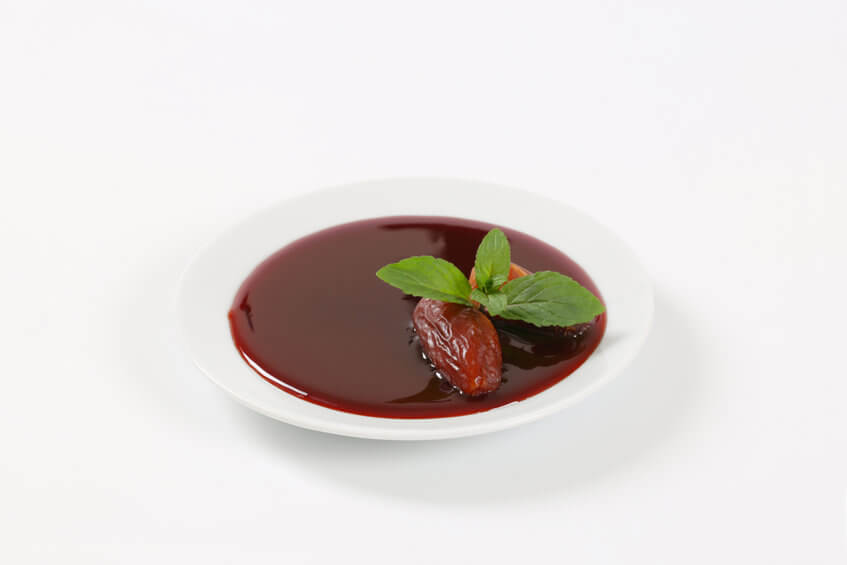When it comes to natural sugars and syrups, there are many different options to choose from. Some are lower in calories, others are higher in nutrients, and still others boast a wide range of health benefits outside of mere nutrition (I’m looking at you, Manuka honey!) Today we’re going to compare two of the leading natural syrup options — date syrup vs honey.
In short, the primary difference between date syrup vs honey is that date syrup contains more nutrition as it uses the entire date fruit. And unlike honey, date syrup is vegan and also contains less allergens. Honey, on the other hand, has more medicinal properties.
Let’s delve into this further.
Date Syrup

So, what is date syrup? Date syrup is made using just two simple ingredients: dates and water. It’s such a simple process that you can easily make date syrup in your kitchen (if you’re going to try it out, apparently Medjool dates are the fruit of choice.)
Delicious and easy to produce, this newly-popular natural sweetener is no modern creation. Date syrup actually has ancient roots: Mesopotamian manuscripts mention this syrup as one of the primary sweeteners of the time, and in the Bible, the Hebrew word for “honey” likely means “date honey,” or date syrup. That means that date syrup is centuries old!
How Date Syrup Is Made
While date syrup has been around since antiquity, the way we process dates to make syrup is likely much different than how our Middle Eastern ancestors would’ve done it.
The easiest way to make date syrup starts with chopping the dates and removing their pits, then simmering the chopped dates on the stove in water for approximately half an hour (dates contain very little liquid, so you have to add some in order to extract the nectar.) The mixture is then removed from the heat and allowed to cool before being blended into a very smooth puree.
Next, it’s strained through cheesecloth to remove all the pulp left from the whole fruit. Then the liquid that was strained out is placed back on the stove to reduce, approximately another half hour.
The Many Benefits Of Date Syrup
The process of making date syrup means that it retains many of the vitamins and minerals that the fruit had, making it a more complex carbohydrate than most sweeteners. Some of those nutrients include potassium, iron, calcium, magnesium, and phosphorus, as well as vitamins A, B, C, and D.
Due to this syrup coming directly from a fruit, it also contains fiber that assists in regulating blood sugars better than other types of sweeteners. This is probably why it registers low on the glycemic index (GI) scale (only 47, compared to refined sugar which comes in at 70), making date syrup a good option for people with diabetes.
Some initial research shows that date syrup may also have an antibacterial effect due to its concentration of phenols (compounds that have antioxidant and anti-inflammatory properties.)
Honey

Just as ancient as date syrup, honey is a strong contender in our comparison of date syrup vs. honey.
Cave paintings from over 8,000 years ago show humans foraging for honey, and we know that the ancient Egyptians and the Mayans participated in bee-keeping activities to produce honey.
There are multiple different kinds of honey available today, from wildflower honey (a polyfloral honey made from the nectar of many different flowers) and blended honey (made from blending honey from multiple different regions together) to the highly specialized and more expensive Manuka honey (a monofloral honey that is only produced in Australia and New Zealand.)
Regardless of which type of honey you buy, all varieties are similar in taste and composition.
The Delicious Benefits Of Honey
While honey is mostly sugar, it does contain some beneficial components: a mix of amino acids, vitamins, minerals, iron, zinc, and antioxidants (although many of these are only present in minuscule amounts.)
Honey has also been found to have many different positive effects, such as being antibacterial, anti-inflammatory, antioxidant, and antifungal.
It has been shown in studies that honey can help heal wounds and burns faster and better than other topical medications.
Additional studies have demonstrated that honey can be a helpful tool in the fight against all kinds of conditions, from IBS and stomach ulcers to eczema, psoriasis, and acne. Some studies have even shown that specific types of honey can help reverse gingivitis and dental disease.
Let’s Talk About Date Syrup VS Honey
Now that we’ve looked at each on their own, let’s see how they stack up against each other! What are the benefits of date syrup vs honey? Is one better than the other?
They’re Both Super Delicious
When it comes to flavor, date syrup and honey are equally palatable. While their flavors may differ, the result is the same—they both add a delicious sweetness to any dish!
The flavor of date syrup is known for being less sweet than honey, maple syrup, or agave, and boasting a flavor profile almost similar to molasses.
Honey’s flavor depends on the plant the bees sourced their nectar from. If the source is something like acacia or clover flowers, the honey is likely to have a lighter color and a mild flavor.
Some honey, like that sourced from buckwheat or Manuka plants, has a darker composition and much stronger flavor.
Regardless, this sweet nectar is regarded worldwide as a delicious natural sweetener.
They Both Boast A Single Ingredient
While date syrup is processed using water, most producers evaporate the water back out at the end of the process—leaving the syrup with just dates and nothing else.
Honey, also, is a single ingredient (or rather, it should be. If your honey doesn’t say “pure” or “100% honey,” there’s a chance it’s been mixed with something like corn syrup to reduce costs.)
When considering date syrup vs honey, the fact that they are both relatively unrefined sweeteners is a win!
They’re Both Very Versatile And Easy
You may have to play with them to get the substitution ratios just right, both date syrup and honey are incredibly versatile as sugar substitutes.
You can bake with them, cook with them, make sauces and marinades, add them to your oatmeal, or even put them in your coffee. When you compare date syrup vs honey, this is one category where they are equal.
Date Syrup May Be Preferable For Diabetics
For those who are on a diabetic diet, sweeteners can be the most challenging thing to find. Most sweeteners are high on the Glycemic Index (GI), meaning they have a significant effect on blood sugar levels.
For diabetes sufferers considering date syrup vs honey, the glycemic index must be considered.
Honey comes in just behind refined white sugar on the GI (58), making it not the best choice for diabetics. Date syrup, however, has a low GI (47) meaning that it is a safer and healthier choice for diabetics.
Honey May Have A Few More Risks
One thing to consider about date syrup vs honey is that it is less risky.
Honey can have Clostridium botulinum spores, which is why it is not recommended in children under the age of 1 (as their digestive systems are not yet prepared to handle this toxin.)
If you are trying to make a recipe of some kind such as homemade elderberry syrup and you want to be able to give it to a child who’s less than a year old, date syrup is your best bet.
Date Syrup Is More Nutritious
Because date syrup is made using the whole fruit, it has higher amounts of beneficial nutrients than honey.
Date syrup contains significantly more potassium, calcium, iron, and magnesium than other natural sweeteners, as well as some fiber and antioxidants.
This makes date syrup a better choice than honey, at least when it comes to nutritional content.
Date Syrup Is Okay for More Diets
Honey cannot be eaten by young children, could cause allergic reactions in people with severe bee or pollen allergies, and is also not accepted by many vegans (who view honeybees as animals, therefore deeming honey an animal product.) It can also be risky for diabetics to eat honey due to its high GI.
Date syrup, however, is acceptable for many kinds of diets. It has a low GI, so it can be enjoyed by diabetics; it has no risk of botulism, so it can be enjoyed by young children. It is also made using nothing but fruit, so it is suitable for even the strictest of vegan diets.
Conclusion
If you’re wondering who wins this battle of date syrup vs honey, it really depends on what you’re looking for out of your natural sweetener.
If you want a sweetener that can be eaten by almost anyone, has a unique, complex flavor, and is easy to make in your kitchen—date syrup is the winner for you.
If you’re looking for a sweetener that is simple, well-recognized, versatile, and has many potential medical benefits, then honey is probably what you’re going to choose.
Thankfully, both sweeteners are all-natural, versatile, simple, and delicious!

